
 |
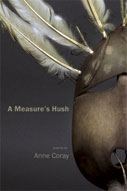 |
In these lyrical meditations on fame and death, Anne Coray celebrates the making of art and the gifts of language while reminding us that worldly pursuits are folly. These are poems for the bereaved, to be read at funerals and wakes or during the course of any ordinary day, offering insights on loss and longing that are oddly comforting. Oddly, because there are deep and oftentimes contradictory emotions at play here, but also hard-won reconciliation. The Egyptians Had it All Wrong (Poetry Foundation Audio) A Measure's Hush by Anne Coray (Boreal Books, 2011) Coray is a poet who lives with wind and knows—however much the roots of things might tunnel and take hold—we will be borne off. Her new poems move through depths of elegy: the green scrub and drought of southwestern Alaska; the loss of a brother; meditations on paint and richnesses of gray, on language and everything it cannot capture. She is always attentive to the way the world resists vision. Snow falls on snow, a white bird rests in a white field, the ground “[does] not rise in greeting.” Through a radiant patience, Coray is present for those moments when something cracks and the air spills into crystal ash, the fern in the rain “breathes the silver message.” Without self-pity, and with immense trust, she shows us, sometimes quietly, how death arranges us to live. —Joanna Klink, author of Circadian
|
||
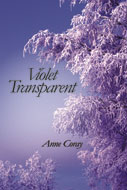 |
Unflinching, elegiac, and sometimes fueled with invective, Violet Transparent examines loss in both the natural and human landscapes. Anne Coray does not shy away from political or environmental commentary, but she knows when to pull back and let the poem be a poem. This collection dares to follow in the footsteps of luminaries like W. S. Merwin and William Heyen, poets whose deep and compassionate regard for nature informs and makes imperative their work. Violet Transparent by Anne Coray (FutureCycle Press, 2010) In "This Close to Permanence" Anne Coray looks into a lake and thinks, "Nothing I've made has such beauty of fusion." Several poems later she asks, "Is it possible, then, to reconcile division?" This, then, is the struggle of this fine poet: by way of the poem, despite lament and anger over our accelerating natural and spiritual losses—to achieve a sustaining vision of language and place that might hold for her listeners, too. Nothing, of course, is certain—"Ask the great auk about guarantees"—but poem after poem here achieves an earned stay against despair, against resignation. I've read Violet Transparent with admiration and gratitude. —Willliam Heyen
|
||
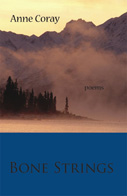 |
Anne Coray’s poems in Bone Strings emanate with an intuitive sense of the Alaskan wilderness where she grew up. As one who is intimate with landscape, she is able to bypass the tendency to conceive wilderness as a pristine, magical presence. Instead, through her poems, she meanders the fractured line between harshness and beauty. She readily confronts the odds of survival and exposes the reader to a certain reality not only about the wilderness of nature, but also about the wilderness of self. —Katie Kingston, Poets West Bone Strings by Anne Coray (Scarlet Tanager Books, 2005) Anne Coray's poems are deeply satisfying for their graceful combination of devotions, to the natural — animal/vegetable/mineral — and to the way nature resonates in us, the humans who live in a "sacred space." She is keenly observant, sensitive without swooning, and conveys both the loveliness and the brutality of her world in a complex and disciplined language.—Rosellen Brown
|
||
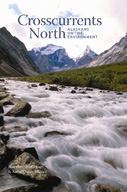 |
In this collection of sixty-one essays and poems, Alaskans express their admiration and awe of the landscape and its wild inhabitants. Celebratory, sobering, and thought provoking, these writings also bear witness to the effects of climate change and development. They ponder the irony of the authors’ own impact, an inevitable consequence of living here. Crosscurrents North: Alaskans on the Environment (University of Alaska Press, 2008) edited by Anne Coray & Marybeth Holleman Preface by Bill McKibben, Foreword by Alaska Governor Jay Hammond If the land has the power to teach us—and I believe that it does—then Alaska is the greatest master teacher in North America and this anthology gathers the voices of some of her most eloquent students. Rising from these pages come the powerful creatures of the North; the rocks, creeks, and bays; the crowds and trash; the grief and passion of citizens who’ve been riled up by wildness to speak on behalf of what they love. —Alison Hawthorne Deming
|
||
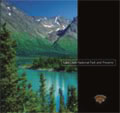 |
Lake Clark National Park and Preserve by Steve Kahn and Anne Coray (Alaska Geographic, 2009) Lake Clark National Park and Preserve is the essence of the north in one national treasure. Within its borders, wildlife and people roam over tundra, along streams and lakes, near the coast, and through vast forests—nearly all of the habitats found in Alaska. The Dena’ina Athabascan name for Lake Clark itself is Qizhjeh Vena, translating roughly “many peoples gather lake.” The Dena’ina know that this lake of rich resources, which enticed people to gather at its shores, is the nucleus, the starting point, from which grandness and diversity radiate out. First place in the Book Category, National Association for Interpretation Media Competition, 2010 Media and Partnership Award, Association of Partners for Public Lands (APPL), 2010
|
||
|
|
|||